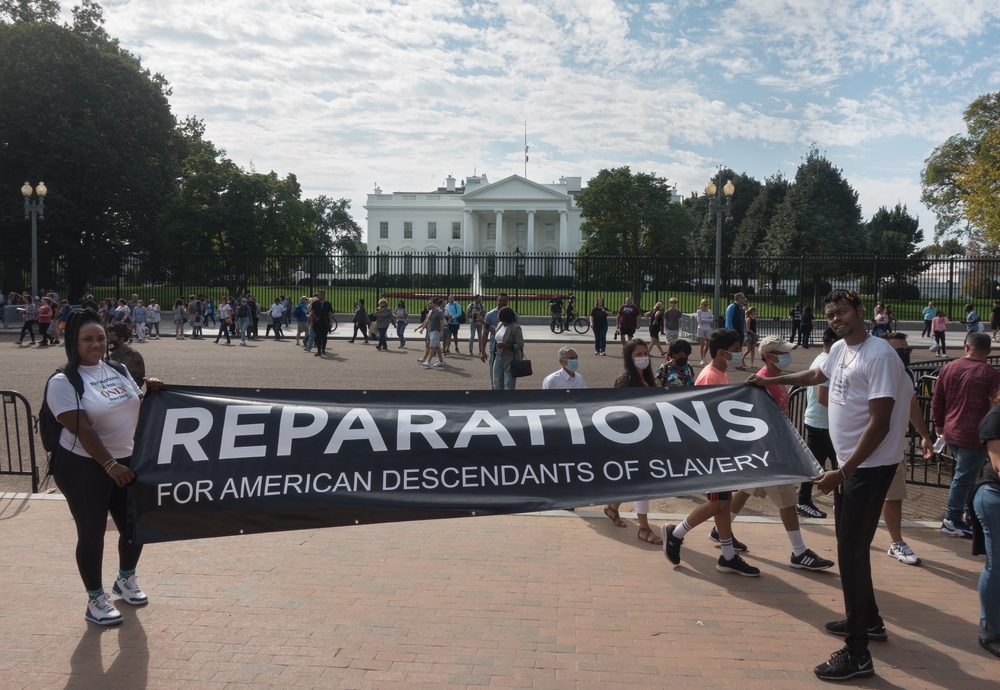Today we mostly associate the idea of reparations for America’s black population with left-wing politics, and that’s no surprise. Only Democratic candidates for president, such as Marianne Williamson, mention reparations as part of their political platform. However, the concept of reparations, properly understood, follows from classical liberal principles of rights to property, freedom of contract, the equal protection of the rule of law, and the right of citizens to freedom from government oppression. Serious libertarian thinkers like Robert Nozick recommended reparations, though they often came up short on the practical details. But we also might think about reparations in the broader sense of “repair,” taking the particular historical perspective of American Christianity and the fraught history of white and black churches. Not as a final word, but as a creative contribution to this sticky question, I offer some thoughts here.
First, it’s important to lay out exactly what the justification for any kind of reparations would be. The example of Japanese internment serves us well as a kind of template: a case in which the government itself violated the civil and economic rights of Japanese Americans, who were eventually compensated financially. The general wisdom is to cut off claims to reparations at about the length of a decent human life, say 60–80 years. Otherwise, we could be relitigating our history of violent usurpations forever, thus undermining the stability of our institutions and our ability to move forward as a legitimate regime. This means that we will concern ourselves with the crimes of Jim Crow, not slavery. It’s relevant, then, that those who suffered under Jim Crow are the exact same people as those that the term ADOS—actual descendants of slavery—would carve out anyway, since 90% of the freedmen remained in the South until the Great Migrations of the mid-20th century. And we also know that while Jim Crow was technically relegated to the South, all kinds of sundown laws, union exclusions, and other forms of rights violations persisted throughout the North as well.
There was also plenty of straightforward government crime against blacks from the Jim Crow period, including eminent domain abuse during “urban renewal” programs and the building of the Federal Highway System; the racist and hubristic redlining practices of the Federal Housing Administration; the collusion of police and courts with various forms of domestic terrorism against black citizens; and the way that federal support for unions translated to exclusion of blacks from many forms of government work. We could go on.
With such a recent history of government oppression of this sector of our population, tracking down the sufferers and their direct descendants is not a particularly difficult task, so how ought the government to make amends? The most common conservative and libertarian complaint against reparations is that in taxing current citizens to pay for it, we would be harming those who never did anything wrong. While the typical leftist response appeals to the notion that all white people have somehow benefited from our history of racism, the classical liberal must strongly disagree. While a few white people may have benefited financially from direct exploitation of their black neighbors, the legal and economic exclusion of any subgroup within a population never benefits the economy overall—rather the opposite. The white population of the United States is poorer than it would have been if black Americans had been allowed to buy homes, go to good schools, move where they wished, and develop their talents fully. This ought to be obvious. While white people in the past may have gotten something they wanted by feeling superior to black people, the fulfillment of such a twisted desire is not a benefit but a deep spiritual loss, as Martin Luther King Jr. argued so eloquently. It “distort[ed] the soul[s] and damage[d] the personality” of our parents and grandparents. My own father, the pastor of a multiethnic evangelical church in St. Louis, Mo., for 40 years, often described how he had to unlearn the racism of his childhood in Chattanooga, Tenn., in order to serve Christ well.
So I must agree with the conservative and libertarian critique that it would be unjust to take from current citizens to pay back Jim Crow survivors and their children or grandchildren for all the injustices they suffered. Instead, the just solution is for the government—the greatest perpetrator of these crimes anyway—to pay out of its own assets. Currently, the central government of the United States holds almost $2 trillion in government lands, and that’s not to mention other assets that might be liquidated. Much could be done with even half this amount, with the added advantageous effect of removing assets from the incompetent management of the state.
Let us suppose that these assets were sold off. What then? A common suggestion among pro-reparations thinkers is to provide so-called public goods such as parks and improvements, but I doubt I am the only one who is deeply skeptical that such a plan would result in anything transformative for the stickiest and most offensive of the remaining black/white inequalities: the wealth gap. While black and white incomes grow closer and closer together, wealth holdings remain quite low among the black American population, an outcome that is believably tied to the very crimes we indict the central government for committing. And state-controlled projects to “help” the black community are no more empowering when called reparations than they are when called welfare. What would be truly transformative? Access to business capital, for one. And the Conscious Black Conservatives have suggested an ingenious plan, in which capital is made available to entrepreneurs with a reasonable amount of beginners’ success under their belts, through loans that will be repaid and so recycled back into the original nest egg. This approach is interesting because it acknowledges that the black community will most likely gain wealth by economically empowering those among them who are already on their way but simply lack capital to expand. Even if it only arises from the reality of our organic networks, black employers are more likely to hire black workers, work with black distributors, and so on. This tendency means that empowering burgeoning black entrepreneurs could have far-reaching effects beyond merely increasing their own wealth holdings.
On the other hand, Glenn Loury has argued that such a race-based approach could have deleterious effects on racial reconciliation nationally, particularly given the economic hopelessness and despair prevalent among poor rural white populations today. This is where things really get thorny, especially as more scholars pay attention to the way that historically “poor white trash” (and out West, Latino populations) were often caught up in the same oppressive systems used against black Americans. While many of these studies come from Marxist historians who want to emphasize the role of class warfare, they’ve had an interesting resonance for conservatives who have long argued that inequalities assumed to be exclusively racial are deeply involved with class as well. It’s worth noting that the source of the wealth gap may be concentrated in the comparison between the wealthiest white and black people, while the lower-income groups among both races have comparable wealth when compared directly with one another. And there’s something attractive about the refusal to perpetuate the historic white supremacist strategy of pitting poor black and poor white Americans against one another. Offering such loans to any means-tested entrepreneur, then, could address racial tensions while still benefiting black Americans—whose poverty rate is double that of white Americans—disproportionately.
Even if the plan for restitution that I offer above gets us a lot closer to justice, that won’t make it politically viable. But the white church in America doesn’t need to take a vote or ask for permission to take up the project of repair and restoration between themselves and the black church. Much of this work will draw upon the concept of transitional justice, so well laid out by Anthony Bradley. One of the most powerful and practical of the seven principles of transitional justice described here is that of institutional memory. Proper memorialization of the past is deeply healing, just as the members of a dysfunctional family must work through their past if they want to move forward with emotional health. We must use plain speech about the record of white churches: the unwillingness to baptize black people to avoid spiritual equality; the Slave Bible, stripped of the Exodus and the minor prophets; the doctrine of the “spirituality of the church,” abused to avoid questions of earthly injustice; the doctrine of “the curse of Ham”; the plantation missionaries and their “gospel” of obedience to masters; support of the KKK; churches with raciallyexclusionary covenant deeds; theological denigration of the black church tradition; and on and on. This is not a matter of ginning up guilt, but simply of telling the truth so that the doctrinal and practical inheritance of white supremacy can be jettisoned while the unique insights of the black church tradition are discovered. Like all truly prophetic calls, the call to listen and cede cultural power back to black Christians from whom it was stolen will benefit white Christians as well. Dietrich Bonhoeffer underwent a significant spiritual awakening through his discipleship in Harlem’s Abyssinian Baptist Church, and I was deeply blessed by my research in the theology and history of the black church for my forthcoming book, Black Liberation Through the Marketplace: Hope, Heartbreak, and the Promise of America.
There’s much more to be discussed here, but an appeal to both classical liberal principles and biblical ones by no means rules out reparations, whether in the form of state restitution or church restoration, in some form.

